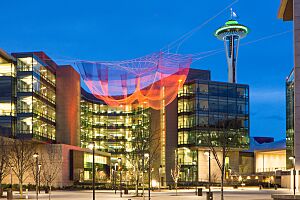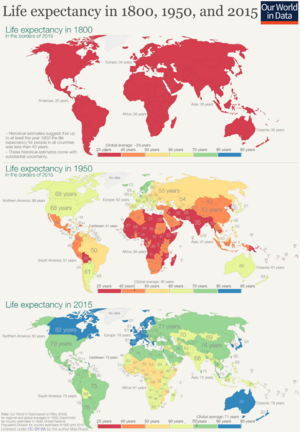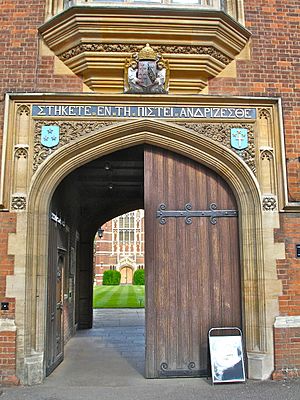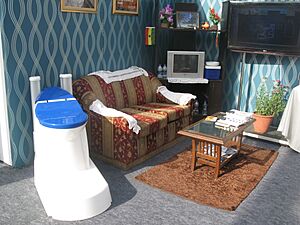Gates Foundation facts for kids
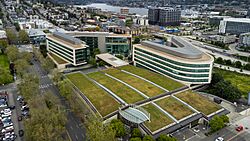
The Gates Foundation headquarters in 2022
|
|
| Formation | 2000 |
|---|---|
| Founders | |
| Type | Non-operating private foundation |
| Legal status | 501(c)(3) organization |
| Purpose | Healthcare, education, fighting poverty |
| Headquarters | Seattle, Washington, U.S. |
|
Area served
|
Worldwide |
| Method | Donations, grants |
|
Key people
|
|
| Endowment | $77.2 billion (2024)[update] |
|
Employees
|
2,167 (2025) |
|
Formerly called
|
|
The Gates Foundation is a large American charity started by Bill Gates and Melinda French Gates. It is based in Seattle, Washington, and was launched in 2000. It is one of the wealthiest charities in the world, with over $77 billion in assets.
The main goals of the foundation are to improve healthcare and reduce extreme poverty around the globe. In the United States, it works to give people better educational opportunities and access to technology. The foundation is led by important people like Bill Gates, CEO Mark Suzman, and investor Michael Larson.
The foundation is known for using business ideas to solve big problems, a method called venture philanthropy. Since it started, Bill and Melinda have donated about $36 billion to the foundation. This money has supported many health and education projects, including creating the famous Gates Cambridge Scholarships at Cambridge University.
Contents
History of the Foundation
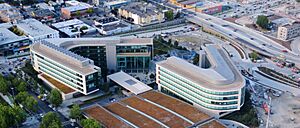
The foundation began in 1994 as the William H. Gates Foundation. In 2000, it merged with another foundation to become the Bill & Melinda Gates Foundation. In 2006, Bill Gates announced he would leave his daily role at Microsoft to spend more time working on the foundation's projects.
In 2005, Time magazine named Bill and Melinda Gates, along with the musician Bono, as Persons of the Year for their charity work.
The foundation built a new headquarters in Seattle that opened in 2011. The campus is very environmentally friendly, with features like a "living roof" covered in plants and solar panels.
Over the years, the foundation has partnered with many other organizations. In 2014, it worked with the Clinton Foundation to study the progress of women and girls worldwide. During the COVID-19 pandemic, the foundation helped organize and fund efforts to fight the virus.
In July 2021, after their divorce, Bill and Melinda French Gates agreed on a plan to continue working together. However, on May 13, 2024, Melinda announced she would be leaving the foundation. In January 2025, the organization was renamed the Gates Foundation, with Bill Gates as the only chairman.
Donations from Warren Buffett
In 2006, the famous investor Warren Buffett promised to give a large part of his fortune to the foundation. He donated billions of dollars in Berkshire Hathaway stock over many years. His gifts came with a rule: the foundation had to give away the money he donated each year, plus more from its own funds. This helped the foundation grow its impact quickly.
In June 2024, Buffett announced that after his death, his children would decide where the rest of his fortune would go.
The Foundation's Lifespan
The founders decided that the foundation will not last forever. The plan is to spend all of its money within 20 years after the deaths of Bill and Melinda Gates. This is different from many other large charities that plan to operate forever.
In May 2025, Bill Gates announced that the foundation will close on December 31, 2045. The goal is to make sure the money is used to solve problems now, instead of spending it on running the organization for many decades.
What the Foundation Does
The Gates Foundation is organized into several program areas. Each one focuses on a different global issue. The foundation must donate at least five percent of its assets every year to keep its charity status.
- Global Development Division
- Global Health Division
- United States Division
- Global Policy & Advocacy Division
- Global Growth & Opportunity Division
The foundation also has an open access policy. This means that any research it funds must be shared freely with the public. This helps scientists and researchers everywhere learn from their work.
Helping People Around the World
The foundation's Global Development Program, led by Christopher Elias, works to fight extreme poverty. It gives grants to organizations that help people in many ways.
Scholarships and Education
In 2000, the foundation created the Gates Cambridge Scholarships. This program allows smart students from all over the world to study at the University of Cambridge in England. It is one of the most famous scholarship programs in the world and is very competitive. Each year, about 100 students receive the scholarship.
Water, Sanitation, and Hygiene
The foundation has a program focused on providing clean water and safe toilets, known as WASH (Water, Sanitation and Hygiene). Many people in developing countries lack access to basic toilets, which can cause serious health problems.
The foundation's work in this area focuses on creating new, sustainable sanitation solutions that don't need to be connected to sewer systems.
The Reinvent the Toilet Challenge
In 2011, the foundation started the "Reinvent the Toilet Challenge." The goal was to inspire the creation of a new kind of toilet that is safe, affordable, and works without plumbing.
The ideal toilet would not only get rid of waste but also turn it into useful resources like clean water, energy, or fertilizer. Research teams around the world have received grants to work on these innovative toilets.
Improving Global Health
The foundation's Global Health Program, led by Trevor Mundel, has donated billions of dollars to fight diseases and improve health worldwide.
Some of its major projects include:
- Fighting Diseases: The foundation has given over $1.3 billion to fight malaria. It also supports the fight against AIDS and tuberculosis.
- Vaccines: The foundation has given billions to GAVI, an organization that provides vaccines to children in poor countries. Thanks to these efforts, deaths from diseases like measles have dropped dramatically.
- Ending Polio: The foundation is a major partner in the global effort to get rid of polio, a crippling disease.
- COVID-19 Response: During the COVID-19 pandemic, the foundation gave hundreds of millions of dollars to help develop vaccines and treatments. It helped start the COVID-19 Therapeutics Accelerator to speed up research.
Projects in the United States
The foundation also works to improve life in the United States, mainly by focusing on education.
Improving Education
The foundation believes that a good education is key to reducing poverty. It has spent billions of dollars on education initiatives. One of its main goals is to help more students graduate from college.
Some of its education projects include:
- Better Schools: The foundation has funded the creation of new, smaller schools to give students more attention from teachers.
- College Scholarships: The Gates Millennium Scholars program has provided $1.5 billion in scholarships for high-achieving minority students.
- Supporting Teachers: The foundation launched the Teaching Channel, a service that provides free professional development videos for teachers.
- Common Core: The foundation was a major supporter of the Common Core State Standards Initiative, a set of educational standards for K-12 students.
Awards and Recognition
- In 2006, the foundation received the Prince of Asturias Award for International Cooperation.
- In 2007, it was awarded the Indira Gandhi Prize in India.
- In 2015, Bill and Melinda Gates received the Padma Bhushan, India's third-highest civilian honor.
- In 2016, President Barack Obama awarded them the Presidential Medal of Freedom for their charity work.
See also
 In Spanish: Fundación Bill y Melinda Gates para niños
In Spanish: Fundación Bill y Melinda Gates para niños
- Bill & Melinda Gates Medical Research Institute
- Corporate social responsibility
- Global Alliance for Improved Nutrition
- List of wealthiest charitable foundations
- Philanthropy
- Social enterprise
 | William M. Jackson |
 | Juan E. Gilbert |
 | Neil deGrasse Tyson |


